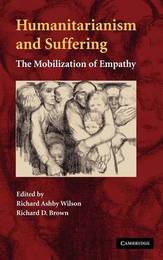
|
Humanitarianism and Suffering: The Mobilization of Empathy
Hardback
Main Details
| Title |
Humanitarianism and Suffering: The Mobilization of Empathy
|
| Authors and Contributors |
Edited by Richard Ashby Wilson
|
|
Edited by Richard D. Brown
|
| Physical Properties |
| Format:Hardback | | Pages:330 | | Dimensions(mm): Height 229,Width 152 |
|
| Category/Genre | Social and political philosophy |
|---|
| ISBN/Barcode |
9780521883856
|
| Classifications | Dewey:341.67 |
|---|
| Audience | | Professional & Vocational | | Postgraduate, Research & Scholarly | |
|---|
|
Publishing Details |
| Publisher |
Cambridge University Press
|
| Imprint |
Cambridge University Press
|
| Publication Date |
17 November 2008 |
| Publication Country |
United Kingdom
|
Description
Humanitarian sentiments have motivated a variety of manifestations of pity, from nineteenth-century movements to end slavery to the creation of modern international humanitarian law. While humanitarianism is clearly political, this text addresses the ways in which it is also an ethos embedded in civil society, one that drives secular and religious social and cultural movements, not just legal and political institutions. As an ethos, humanitarianism has a strong narrative and representational dimension that can generate humanitarian constituencies for particular causes. Essays in the volume analyze the character, form, and voice of private or public narratives themselves and explain how and why some narratives of suffering energize political movements of solidarity, whereas others do not. Humanitarianism and Suffering explores when, how, and why humanitarian movements become widespread popular movements. It shows how popular sentiments move political and social elites to action and, conversely, how national elites appropriate humanitarian ideals for more instrumental ends.
Author Biography
Richard A. wilson is Gladstein Distinguished Chair of Human Rights, Professor of Anthropology, and Director of the Human Rights Institute at the University of Connecticut. He is the author or editor of numerous works on human rights, truth commissions, and international criminal tribunals, including Maya Resurgence in Guatemala, The Politics of Truth and Reconciliation in South Africa, Low Intensity Democracy, Human Rights, Culture and Context, Culture and Rights, Human Rights in Global Perspectives, and Human Rights and the 'War on Terror.' He has been a visiting professor at the University of Oslo, Norway; the New School for Social Research; and the University of the Witwatersrand, South Africa. He is a member of the Committee for Human Rights of the American Anthropological Association. In addition, he serves on the editorial boards of Critique of Anthropology, the Journal of the Royal Anthropological Institute, the Journal of Human Rights, the Journal of Transitional Justice, and the Journal of Social Justice. Richard D. Brown is Board of Trustees Distinguished Professor of History and Director of the University of Connecticut Humanities Institute. He specializes in the cultural and political history of early America and is the author of The Hanging of Ephraim Wheeler: A Story of Rape, Incest, and Justice in Early America with Irene Quenzler Brown; The Strength of a People: The Idea of an Informed Citizenry in America, 1650-1870; Knowledge Is Power: The Diffusion of Information in Early America, 1700-1865; and Major Problems in the Era of the American Revolution, 1760-1791, among other works. Past president of the Society of Historians of the Early American Republic, he has held fellowships from the John Simon Guggenheim Foundation, the National Endowment for the Humanities, the Social Science Research Council, and the Woodrow Wilson Foundation. Currently, he serves on the editorial board of the New England Quarterly.
Reviews'... a very timely volume that should appeal to a wide range of anthropologists.' Journal of the Royal Anthropological Institute
|